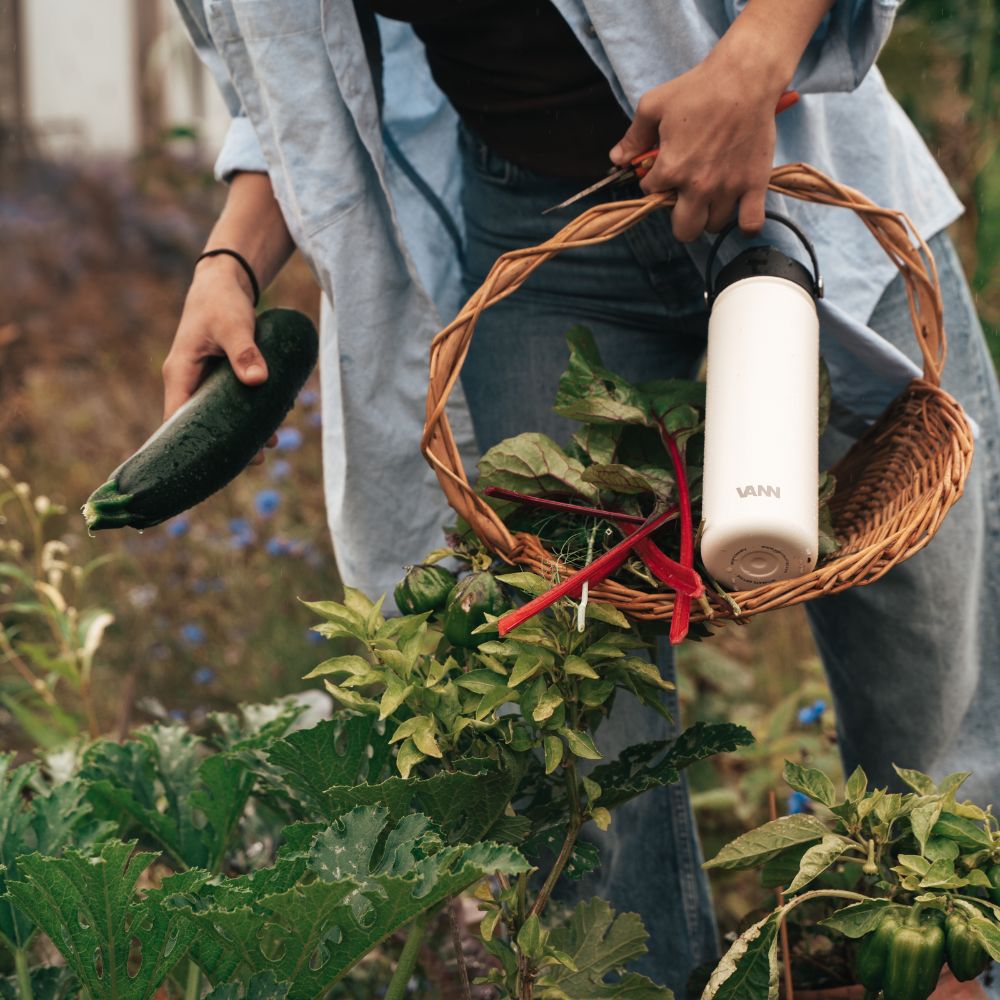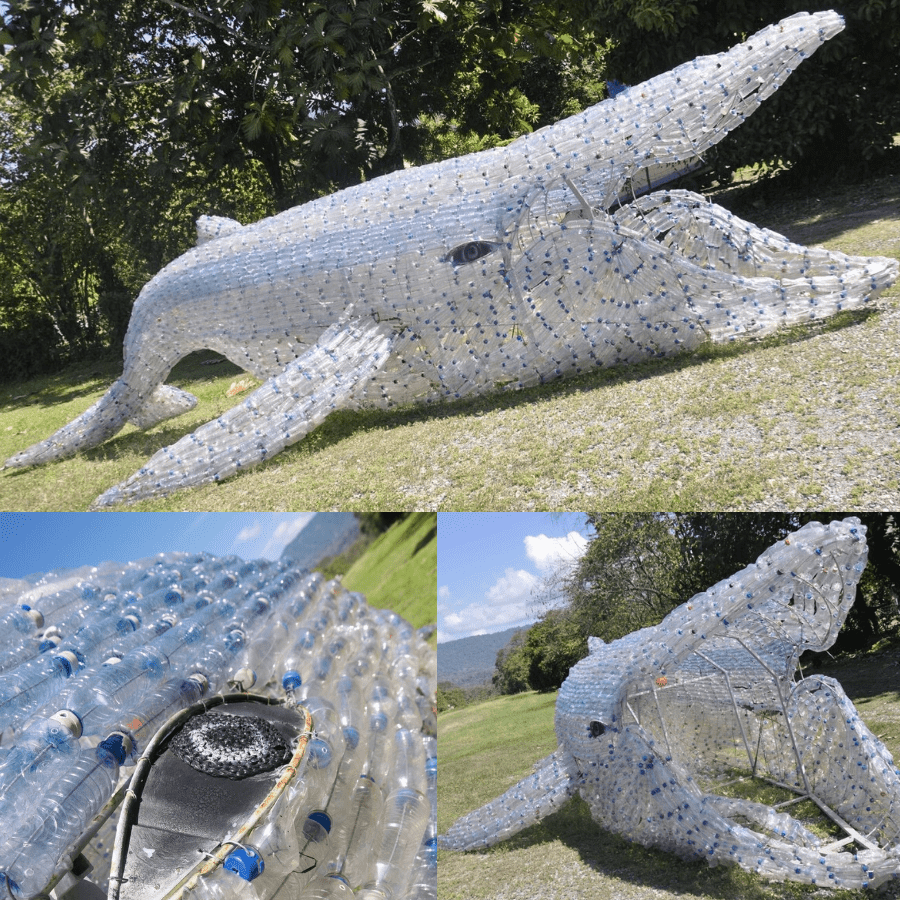How much water per day?
| VANN Water Calculator | |
| Weight | |
| Activity | |
| Climate | |
| Water requirement per day |
Click on calculate
|
7 Handy Hydration Tips
1. Start your day with water
Drink a glass immediately after waking up to reactivate your body after the night.
2. Divide your intake
Choose small sips throughout the day instead of drinking everything at once.
3. Use your bottle as a reminder
Put your bottle in plain sight so you're less likely to forget to drink.
4. Link drinking to routines
Drink a glass of water with every meal or coffee break for regularity.
5. Pay attention to signals
Thirst, fatigue or headaches can be a sign that you are dehydrated.
6. Fill your VANN bottle at fixed times
Maintain a consistent rhythm by topping up in the morning, afternoon and evening.
7. Extra tip for heat or sports
Drink a little more than normal to replace fluids lost due to heat or exercise.
WHY DRINKING WATER IS SO IMPORTANT
Water is essential for our bodies and plays an important role in many bodily functions. Below we discuss some of the most important benefits of drinking enough water.
1. It aids in digestion
Water aids in digestion by transporting nutrients and removing waste. It makes it easier for food to move through the body and prevents constipation. Not drinking enough water can lead to constipation and poor digestion.
2. It regulates body temperature
Water plays an important role in regulating our body temperature. When we lose a lot of water through sweating, for example during sports or working in a warm climate, it is important to replenish this water quickly to prevent overheating.
3. Better night's sleep
A sip of water before going to sleep not only keeps your fluid balance in check. It also balances your muscles, joints and hormones. This ensures that your body relaxes better. This can prevent insomnia. This way you get enough sleep and wake up refreshed!
4. It supports the skin
Water is also important for the health of our skin. When we don’t drink enough water, our skin can feel dry and flabby. Drinking enough water helps to keep the skin hydrated and elastic, making it look healthier and younger.
5. It supports memory and concentration
Water is also important for our brains and helps with concentration and memory. When we do not drink enough water, we can suffer from headaches, fatigue and poor concentration.
6. It helps maintain your weight
Drinking enough water can also help manage our weight. Water has no calories and helps fill us up, making us less likely to overeat. In addition, water aids in digestion and waste removal, which can also help maintain your weight.
HOW DOES WATER AFFECT OUR ENERGY?
One of the most important ways water affects our energy is by helping us stay hydrated. If we don’t drink enough water, we can feel tired, sluggish, and even nauseous. Additionally, drinking enough water is important for regulating our blood pressure, which also affects our energy.
WHAT ARE THE CONSEQUENCES OF DRINKING TOO LITTLE WATER?
If you don’t get enough fluids, you can become dehydrated. Your body can survive for several weeks without food, but only a few days without water. If you lose more than 7-8% of your body weight in fluids, you will gradually lose consciousness. That’s why it’s important to drink enough during sports, for example, because even a loss of 2% of fluids can negatively affect your performance.
Let's give an example. Imagine that someone weighing 89 kg exercises intensively and after this effort still weighs 85 kg, which means a difference of 4 kilos of fluid. This amounts to 4.5% of body weight. It may seem extreme, but during an hour of running you can already lose 2 liters of fluid. During training with a higher intensity and unfavorable conditions (e.g. weather conditions) the loss can be even greater.
To maintain your performance during exercise, it is important to drink enough before, during and after training. A good rule of thumb is to consume 1.5 litres of water for every kilogram of fluid lost. This is more than the loss, but the extra 0.5 litres is needed to compensate for the fluid loss via the bladder.
HOW DO YOU KNOW IF YOU ARE DRINKING ENOUGH WATER?
A good way to determine this is to check the color of your urine. If the urine is light colored, this means that your hydration percentage is okay. However, darker urine indicates a lack of hydration and it is wise to drink more water. It is especially useful to check this before you exercise, to know where you are starting from.
SYMPTOMS OF A DEFICIENCY
The most common signs of dehydration are as follows:
- thirst (this feeling decreases as you get older);
- hunger (your body sometimes confuses hunger and thirst);
- a dark colored urine;
- a dry mouth and lips;
- headache;
- dizziness or feeling light-headed;
- fatigue;
- poor concentration;
- blockage.
In extreme cases these are:
- drowsiness, confusion;
- dark circles under the eyes and sunken eyes;
- dry mucous membranes;
- dry-looking skin that doesn't bounce back immediately when you squeeze it;
- cramps in your arms and/or legs;
- low blood pressure;
- heart rhythm disturbances and a rapid heart rate;
CAN YOU DRINK TOO MUCH WATER?
Yes, drinking too much water can have harmful effects on our bodies. Our kidneys can only process a limited amount of water per hour (0.7 to 1 liter) and when we drink too much, we can develop low sodium levels in our blood, which can lead to arrhythmias in our heart. Extreme amounts of water can even cause water to accumulate in our brain. It is important to realize that water intoxication is a serious risk. Fortunately, less than 1% of marathon runners develop symptoms of water intoxication. However, some groups of people, such as those who run a marathon for more than 4 hours or those who run or walk in colder weather conditions, are more susceptible to this risk. The most effective way to prevent water intoxication is to rely on our natural indicator: thirst.
TIPS FOR DRINKING ENOUGH WATER
To ensure you drink enough water, you can apply the following tips:
- Set an alarm: Set an alarm to remind you to drink water. This will help you stay on track and ensure your daily water intake.
- Use a water bottle : Take a water bottle with you to work or on the go so you always have enough water on hand.
- Add flavor: If you don't like the taste of your water, you can flavor it by adding fruits, vegetables, or herbs, for example.
- Make it a habit: Make drinking water a regular part of your daily routine. You will soon notice that your body gets used to it and you reduce the temptation to drink other beverages.
WATER FROM THE TAP OR FROM A BOTTLE?
In the Netherlands, tap water is so good that you really don't need to waste money on bottled water. Abroad, it differs per country. For example, the water in most European countries is good, but you should definitely not drink it if you are in Africa, for example. It is therefore wise to find out before you go on holiday whether you can drink the water from the tap at your holiday destination. In general, it is clearly indicated whether tap water is drinkable and if in doubt, you can always opt for bottled water.
DRINKING WATER IN A HOT CLIMATE
In a warm climate (and even on a warm day in the Netherlands) our body loses more moisture. This is because we sweat more than normal in the heat. This makes it important to drink extra water. The advice in a warm climate is to drink at least 2 liters of water per day and preferably a bit more.
Be aware that the heat affects your thirst. This often decreases in warm weather. Also, if you do not drink anything for a long time, for whatever reason, your thirst disappears and this can of course be very dangerous. You will not be the first to trust your thirst and be admitted to a foreign hospital with symptoms of dehydration, while you have not been thirsty at all. So make sure that you drink enough water in a warm climate, even if you are not thirsty.
BRING WATER WHEN YOU GO OUT
If you are going on a trip, a day trip or a journey, you still want to drink enough water. Many people choose to take a bottle of water with them and refill it with tap water. However, be aware that if this is a regular plastic bottle, there is a chance that, if you drink from the same bottle regularly or for a long time, the bottle will become dirty and bacteria will develop. That is why it is better to use a reusable water bottle , preferably made of glass or stainless steel so that bacteria cannot attach themselves. By rinsing it daily with soapy water, you will always drink from a clean bottle.
RECOMMENDED AMOUNT OF WATER PER DAY
The recommended amount of water per day varies. It depends on several factors, such as age, weight, activity level and climate. But as a general guideline, it is recommended to drink about 2 liters of water every day. That is about 8 glasses of 250 ml.
It is important to know that this recommended amount is a guideline and can be different for everyone. For example, people who exercise a lot or work in a warm climate need more water than people who have a sedentary lifestyle.
HOW IS THE AMOUNT OF WATER TO DRINK CALCULATED?
There are a number of ways to determine how much water you need per day. A well-known way is the formula: (body weight in kilograms) x 0.033 = recommended amount of water in liters per day.
To find out what the recommended amount of water per day is for you personally, you can fortunately make it a lot easier for yourself these days. For this purpose, we have developed a handy calculator. You can easily fill it in above this text. This way you know exactly how much water you should drink per day and ensure that you keep your body in top condition.
FINALLY
As you have read in this blog, drinking enough water is important for our health and maintaining your body and contributes to a healthy lifestyle. The recommended amount of water per day varies depending on several factors, but as a general guideline it is recommended to drink around 2 liters of water every day. Drinking water supports many bodily functions including digestion, regulation of body temperature, skin health, memory and concentration and weight management. Make sure you drink water regularly and listen to your thirst to ensure you are getting enough water.












